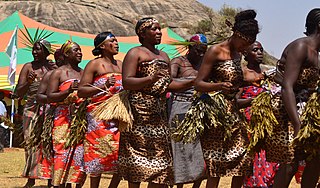Related Research Articles
Zizilivakan, also known as Fali of Jilbu and Ulan Mazhilvən, is a Chadic language spoken in Cameroon in Far North Province and neighboring Nigeria. It is one of several in the area that go by the name Fali.

Goji, goji berry, or wolfberry is the fruit of either Lycium barbarum or Lycium chinense, two closely related species of boxthorn in the nightshade family, Solanaceae. L. barbarum and L. chinense fruits are similar but can be distinguished by differences in taste and sugar content.
The Bete language of Nigeria is a nearly extinct language spoken by a small minority of the 3,000 inhabitants of Bete Town, Takum, Taraba State; its speakers have mostly shifted to Jukun Takum. It is close to Lufu.
The Kurama or T'kurmi or Akurmi language is a Kainji language of Nigeria. Kurama speakers are found in the central northern Nigerian states of Kaduna, Bauchi, Borno, Kano, Jigawa and Plateau.

The West Chadic languages of the Afro-Asiatic family are spoken principally in Niger and Nigeria. They include Hausa, the most populous Chadic language and a major language of West Africa.
Afade (Afaɗə) is an Afro-Asiatic language spoken in eastern Nigeria and northwestern Cameroon.
Hya is an Afro-Asiatic language spoken in northern Cameroon and neighboring regions of Nigeria.

Bata (Gbwata) is an Afro-Asiatic language spoken in Nigeria in Adamawa State in the Numan, Song, Fufore and Mubi LGAs, and in Cameroon in North Province along the border with Nigeria. Dialects are Demsa, Garoua, Jirai, Kobotachi, Malabu, Ndeewe, Ribaw, Wadi, and Zumu (Jimo). It is often considered the same language as Bacama.
Fali, or Fali of Mubi after the local city, is a Chadic dialect cluster spoken in Nigeria, in Adamawa State in the Mubi North and Michika LGAs. It is one of several languages in the area that go by the generic name Fali.
Nzanyi is an Afro-Asiatic language spoken in Nigeria in Adamawa State in Maiha LGA, and along the border in Cameroon. Dialects are Dede, Hoode, Lovi, Magara, Maiha, Mutidi, Nggwoli, Paka, and Rogede.

The Bole–Tangale languages are a branch of West Chadic languages that are spoken in various states of northeastern Nigeria.
Bure, also known as Bubbure, is an Afro-Asiatic language belonging to the Bole-Tangale group of the West branch of the Chadic family. It is spoken in northern Nigeria in the village of Bure and in some small settlements nearby. The language is used mostly by a very few speakers, of great-grandparental generation. Except for Hausa, which is lingua franca in the area, Bure is surrounded by other Chadic languages such as Gera, Giiwo and Deno . Compared to other languages of the same group, the endangerment of Bure is by far the most critical.
Glavda is an Afro-Asiatic language spoken in Borno State, Nigeria and in Far North Province, Cameroon.

Ron is an Afro-Asiatic language cluster spoken in Plateau State, Nigeria. Dialects include Bokkos, Daffo-Mbar-Butura, Monguna. Blench (2006) considers these to be separate languages.
Khushi or Kushi may refer to:
Jarawa is the most populous of the Bantu languages of eastern Nigeria. It is a dialect cluster consisting of many varieties.
Jili (Lijili) is a Plateau language of Nigeria. It is one of several languages which go by the ambiguous name Koro.
Barkul (Bo-Rukul) is a Plateau language of Barkul village, Bokkos LGA, Plateau State, Nigeria. The two dialects, Bo and Rukul, each with 500-1,000 speakers, are notably distinct. The classification of Barkul is unclear, but it appears to be closest to Fyam and Horom.
Hdi is an Afro-Asiatic language of Cameroon and Nigeria.
Vono, also known as Kiwollo (Kiballo), is a nearly extinct Kainji language of Nigeria.
References
- ↑ Goji at Ethnologue (18th ed., 2015) (subscription required)
- ↑ Blench, Roger (2019). An Atlas of Nigerian Languages (4th ed.). Cambridge: Kay Williamson Educational Foundation.